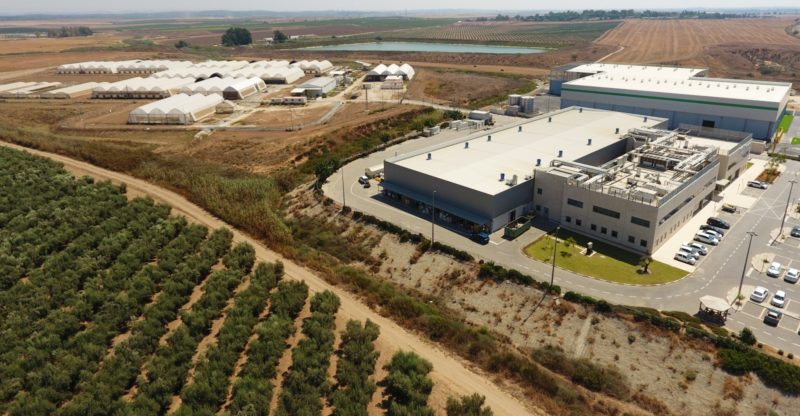The Breath of Life (BOL) compound is the largest medical cannabis facility in the world. From the outside, it looks like any other industrial area complex. But inside, it is a one-stop-shop of innovative services for formulation development and manufacturing of drug development.
In addition to advancing its own products, BOL has become one of the country’s go-to sites for international collaboration.
“There is huge interest in coming to use Israel as a lab for testing different kinds of products, different drug delivery systems, different kinds of innovative ideas in order to find new drugs that are based on cannabinoids,” Tamir Gedo, CEO of Breath of Life Pharma, noting he hosts international visitors on an almost daily basis.
Israeli research is credited with making the study of cannabis legitimate in the international scientific community. It has also widely accepted that this evidence-based research by Hebrew-speaking scientists propelled 29 US States to legalize medical marijuana.
Israel’s reputation in pharmaceutical development and biotechnology is also globally recognized. Copaxone, Provigil, Azilect, Qvar, and a host of other brands all trace back to this Middle Eastern country.
So, as the medical marijuana market continues to grows, and more biotech companies aim to develop cannabinoid-based drugs and delivery systems, Israel’s renowned medical marijuana research and government-sponsored cannabis program – together with its pharma and biotech prowess – are now attracting international collaboration research and development projects.
The US holds 35% of the global pharmaceutical market, according to New Frontier Data. Statista estimates that the US consumer market for cannabinoid pharmaceuticals will exceed $50 billion by 2029.
“Israel is a hotbed of quality cannabis research, because they have a much more favorable regulatory climate for doing serious scientific research on medical cannabis,” Charles Pollack, director of the Lambert Center for the Study of Medicinal Cannabis at Thomas Jefferson University in Philadelphia, recently told Rolling Stone.
The Lambert Center is one of the American institutions now partnering with BOL. BOL, of course, is just one example whereby global companies are using Israel as a medical marijuana research center.
“Most of the countries that look for scientific evidence … are looking to Israel to lead the way,” says Dr. Yehuda Baruch, founder of the Israeli Medical Cannabis program of the Israel Health Ministry and presently the Chief Scientific Officer and Head of Regulatory Affairs at One World Cannabis.
The United States has the biggest legal marijuana market. But American researchers only have one source – a 12-acre farm at the University of Mississippi – for obtaining marijuana for federally funded medical research.
In Israel, a country barely bigger than the New Jersey, there are eight growers. In addition, this is a country known for its expertise in agriculture and innovation, and that means Israel can provide incoming scientists and researchers with high quality medical-grade cannabis, exact strains, pharma development and access to clinical trials.
There are over 100 clinical trials and studies currently on the go in Israel.
“In Israel, clinical trials using marijuana are just as difficult to do as any other medical clinical trial. It’s not harder. Israel does a lot of clinical studies in all biomedical arenas, and so, this is just another one,” says Yaron Eshel, Director of Life Sciences at iCAN Israel Cannabis.
“Israel can be a hub for Phase 1 and 2 trials, there’s not much bureaucracy in the Israeli market, and it’s fairly easy to get approval as long as the protocols are met,” says Gedo, noting BOL Pharma has a 95% approval rate for protocols it submitted to Israel’s Health Ministry in the last two years. “If you know what you’re doing, it is fairly easy to get the IRP and permission … and from there you can start the trial.”
The costs of running a clinical trial in Israel are between three to six times cheaper, according to Gedo, than in the US. He puts the price tag of a year to year-and-a-half study at $1 million-$1.5 million. “Even if it was more expensive, this is the only place you can do it,” he says.
Among the collaborations taking place is GW, maker of Sativex, and the world leader in cannabinoid pharmacology, working with Professor Raphael Mechoulam, a pioneer in the field of cannabis research and the man credited for the discovery of the endocannabinoid system.
The Hebrew University researcher, Mechoulam, can also be found working with his colleague, Professor Francesca Levi-Schaffer, a global expert in asthma research, on a CIITECH-sponsored study aimed at finding a therapeutic benefit of cannabis for the treatment of asthma.
San Francisco’s Kalytera Therapeutics, a clinical-stage pharmaceutical company developing cannabinoid therapeutics for graft versus host disease (GVHD), is currently advancing its Phase 2 clinical program, and said in a statement that the trial will take place in Haifa. Results of the study are expected by Q3 2018.
California-based medical cannabis laboratory Steep Hill Labs has a joint venture with iCAN:Israel-Cannabis, an Israeli pharma company, to advance research on the cannabis plant.
Gedo says BOL is currently running over a dozen of its own clinical trials as well as over a dozen other trials with Australian, US and Canadian companies and academic entities. But he expects that number to more than double by next year.
Israel’s appeal as an outsourcing destination also has to do with its government, which has announced plans to make the country as big a player as possible in the growing global medical marijuana arena. (http://www.emeraldreport.com/israel-way-becoming-center-medicinal-cannabis-movement/)
The Israeli Health Ministry has its own Medical Cannabis Unit.
“They are ahead of the industry. This may be the first time that a regulator is acting and working more efficiently than any industry leader,” Gedo says. “The Israeli Ministry of Health managed to create a very clever ecosystem. On the one hand, it is sparking a lot of innovation. On the other hand, it is a very careful, medical-based system … and this is something that is very clever. You can be conservative and innovative at the same time.”
Viva Sarah Press is a journalist who specializes in writing about creativity and innovation taking place in Israel and beyond. She is also a speaker, content writer, and medical clowning student. Learn more about Viva online: https://www.facebook.com/VivaSarahPress/










